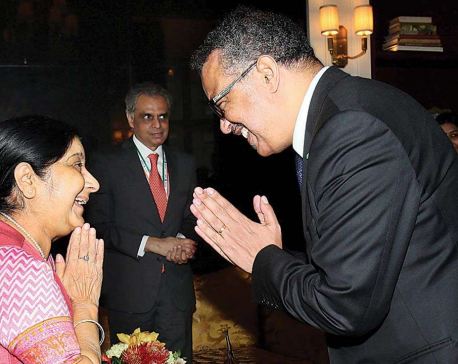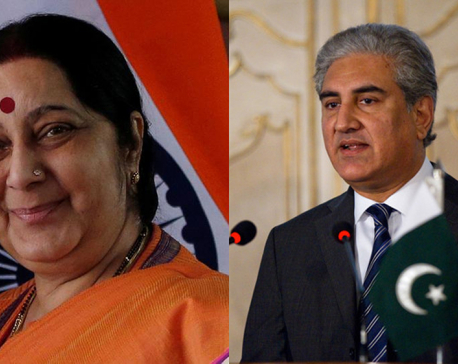
OR
Pakistan calls for UN probe into Kashmir rights abuses
Published On: September 30, 2018 01:30 PM NPT By: Agencies
Pakistan's FM Shah Mehmood Qureshi tells UN General Assembly Islamabad will allow inquiry commission to Pakistan-administered Kashmir, hoping "India too will do the same", after Indian FM Sushma Swaraj accused Islamabad of "hypocrisy".
WASHINGTON, Sept 30: Following harsh words from India's foreign minister at the UN General Assembly, the Pakistani counterpart returned the favour on Saturday, by calling for a UN commission to investigate "violations of human rights" in disputed Kashmir, in a new chapter in one of the world's most bitter confrontations.
Pakistan's Foreign Minister Shah Mehmood Qureshi hailed the first-ever and recently-released UN human rights report on disputed Kashmir, and called for a UN probe on both sides of tiny Himalayan region, in his address to the General Assembly.
Qureshi said, "The report rightly lifts the veil from decades of obfuscation and chronicles the massive ongoing violations of human rights in Indian-occupied Kashmir."
"Pakistan endorses the UN report and calls for early institution of a Commission of Inquiry under UN auspices to investigate and fix responsibility," he said.
"We will welcome the Commission to Azad Jammu and Kashmir [Pakistan-administered Kashmir], and hope that India too, will do the same."
Spar over talks cancellation
Just last week, Pakistan's Prime Minister Imran Khan labeled India "arrogant" for cancelling what would have been the countries' first high-level talks in years.
Qureshi kept up the rhetoric at the UN, saying India's cancellations have been based on "flimsy grounds."
"They (India) preferred politics over peace," he said, while calling out India for backing "terrorism."
His strong words followed a similarly bruising address by Indian Foreign Minister, Sushma Swaraj, who accused Islamabad of "hypocrisy."
She said Pakistan offered "spawning grounds for terrorism" and provided "safe haven" for al-Qaeda founder Osama bin Laden.
"Pakistan glorifies killers. It refuses to see the blood of innocents," she said.
At the heart of bilateral tensions
Resumption of talks have been stalled for years over the dispute of Kashmir, claimed by both countries and ruled in part by each of them since 1947.
Anti-India sentiments run deep in Muslim-majority Kashmir which has been divided by a highly militarised de facto Line of Control (or LoC) into Pakistan and India-administered Kashmir.
Over two dozen rebel groups have been fighting against Indian rule since 1989, demanding the Himalayan region be united with Pakistan or become an independent country.
India, which has stationed over 500,000 troops in the region, accuses Pakistan of arming and training the rebels, which Islamabad denies.
Pakistan says it only gives moral, political and diplomatic support to the Kashmiris and that the dispute must be settled according to several UN resolutions on it.
Nearly 100,000 people, mostly civilians, have been killed in the uprising and the ensuing Indian military crackdown.
'Flimsy grounds'
Qureshi said that India had called off talks three times - "each time on flimsy grounds."
"They used the pretext of stamps issued months ago of a Kashmiri activist and depicting grave human rights violations, including pellet gun victims, as an excuse to back out from the talks," he said.
Swaraj denied New Delhi was against talks, saying, "We are accused of sabotaging the process of talks with Pakistan. This is a complete lie."
India, earlier this month, decided to drop the idea of the proposed meeting with Pakistan, the first such high-level talk planned in years between the nuclear rivals, to protest about the killing of Indian soldiers and police and the glorification of a Kashmiri rebel commander by Islamabad.
Pakistan recently issued postage stamps of Burhan Wani, a charismatic Kashmiri rebel fighter killed by Indian troops in July 2016, whose death sparked a wave of anti-India protests in the territory.
Warning against India's 'limited war'
Qureshi said Imran Khan's election two months ago had brought about "a fundamental shift" in Pakistan, which is seeking dialogue to resolve the Kashmir dispute.
Despite the call for talks, the foreign minister firmly warned India that violations of the ceasefire line in Kashmir "will evoke a strong and matching response."
"Despite numerous violations Pakistan has acted with restraint. But if India does venture across the LoC, or acts upon its doctrine of "limited" war against Pakistan, it will evoke a strong and matching response," Qureshi warned.
You May Like This

SAARC meet at UNGA: Peace, security essential for progress says Sushma Swaraj
NEW YORK, Sept 28: New York: External Affairs Minister Sushma Swaraj emphasised to SAARC countries that an environment of peace and... Read More...

Kashmir is Pakistan’s ‘annual itch’, says India on eve of UNGA
UNITED NATIONS, Sept 25: Ahead of the United Nations General Assembly (UNGA), India has sent a stern message to Islamabad... Read More...

Indo-Pak foreign ministers to meet on sidelines of UNGA
NEW DELHI, Sept 20: Following a letter from Pakistan Prime Minister Imran Khan to his Indian counterpart Narendra Modi regarding the resumption of talks,... Read More...





Just In
- MoHP cautions docs working in govt hospitals not to work in private ones
- Over 400,000 tourists visited Mustang by road last year
- 19 hydropower projects to be showcased at investment summit
- Global oil and gold prices surge as Israel retaliates against Iran
- Sajha Yatayat cancels CEO appointment process for lack of candidates
- Govt padlocks Nepal Scouts’ property illegally occupied by NC lawmaker Deepak Khadka
- FWEAN meets with President Paudel to solicit support for women entrepreneurship
- Koshi provincial assembly passes resolution motion calling for special session by majority votes






_20220508065243.jpg)






Leave A Comment